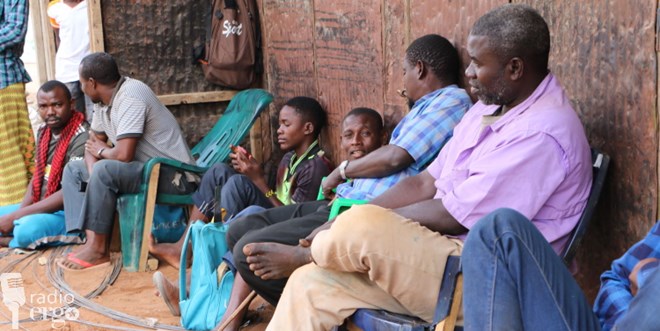
Wednesday August 25, 2021

Somali refugee workers in Dadaab sit idle with their construction equipment/Ahmed Abdullahi/Ergo
(ERGO) – Like many other Somali refugees, construction worker Bashir Mohamed Abukar, 45, has been out of work for three months, as fear that the vast Dadaab refugee camp complex in Kenya is set to close puts a damper on economic activity.
Bashir’s large family of four wives and 22 children have been living on one meal a day since June. His job building and maintaining houses used to put three meals on the table for all of them.
“The residents whose homes we constructed are themselves hopeless,” Bashir declared. “They are just sheltering in their ruined houses as they are, without renovating them.”
The Kenyan government said in April that it will close the camps housing 200,000 Somali refugees by June 2022.
Bashir, who arrived in Dadaab from Jilib in Somalia’s Lower Juba region in 2008, was team leader of 10 builders. He used to be able to give each of his wives 500 Kenya shillings, roughly five dollars, a day for housekeeping. Jobless now, even his children’s education has been disrupted as he cannot pay the monthly fees for their Koranic school and the tutor they had for extra classes.
“I owe the teachers a total of 8,500 shillings (roughly 80 dollars). Just today the madarassa teacher asked for his money. I told him, look man, I earned a living as a builder and this is the situation now. I don’t have anyone abroad to support me and I am out of a job, so let’s come up with a solution,” Bashir said.
He says he does not plan on returning to Somalia unless repatriation becomes his only option.
The UN’s World Food Programme (WFP) distributes dry food to the refugees in Dadaab once every two months. Each family receives seven kgs of rice, two of lentils, two litres of cooking oil, and two bars of soap.
Mohamed Abdullahi Arbow, another builder, told Radio Ergo’s local correspondent that his family finishes the WFP food rations in less than a month. He used to be able to supplement the aid from his earnings, but now he is jobless.
“The whole situation is complicated. We are suffering, confused! At the moment, nobody is being resettled by the UN. We were told we would be resettled in two to three months,” he said.
Commenting on the downturn in the camp economy, he said: “We used to all be interdependent before this uncertainty clouded us.”
Mohamed, who arrived in Dadaab in 1992 from Jamame in Lower Juba, said that in his 14 years working in construction in the camps he has never experienced such hardship. He was forced to ask for help from some distant relatives living abroad. He is worried about the future.
He says he is not interested in being repatriated to Somalia and is awaiting the outcome of an application through UNHCR for resettlement to a third country.
The Kenyan government has issued many warnings that the refugee camps pose a security risk to Kenya.
Bishar Hussein Alas, the chairman of Hagadera camp, the oldest in the Dadaab camp complex, told Radio Ergo they had heard talks were going on between the UN’s refugee agency UNHCR and the Kenyan government. He urged the refugees to continue living their daily lives as normal.